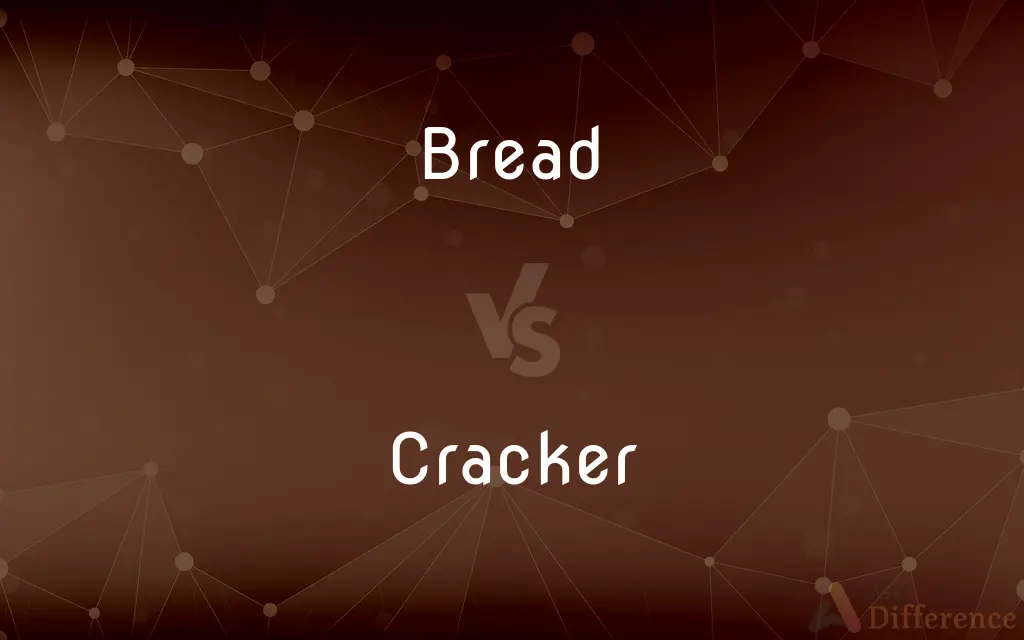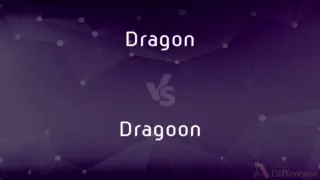Bread vs. Cracker — What's the Difference?
Edited by Tayyaba Rehman — By Maham Liaqat — Updated on March 11, 2024
Bread and crackers are staple foods in many diets, with bread being a soft, leavened or unleavened staple, while crackers are thin, crisp, and usually unleavened snacks.

Difference Between Bread and Cracker
Table of Contents
ADVERTISEMENT
Key Differences
Bread, a fundamental part of many diets worldwide, is typically made from flour, water, and often yeast, which causes it to rise. The texture of bread can vary from soft and fluffy to dense and chewy, depending on the ingredients and preparation method. Crackers, on the other hand, are thin, crispy baked goods that are usually unleavened, meaning they do not contain yeast or another rising agent. They are made from flour and water, often with added fats, seasonings, and sometimes leavening agents to achieve a light, airy texture.
The preparation process for bread typically involves mixing, kneading, rising, and baking, which can be time-consuming due to the need for the dough to rise before baking. This process contributes to bread's soft, airy texture. Crackers, however, are usually mixed and rolled out thinly before being baked, which results in their characteristic crispiness. The lack of a rising step makes the cracker-making process generally quicker and simpler than that of bread.
While both bread and crackers are made from similar basic ingredients, the variations in their recipes, preparation, and cooking methods lead to distinct differences in texture, taste, and culinary uses. Bread's soft, chewy nature makes it ideal for sandwiches, toast, and as an accompaniment to meals, whereas crackers are favored for their crispiness, making them a popular choice for snacks and appetizers.
Understanding the distinctions between bread and crackers is key for choosing the right option for a particular meal or snack, as their different textures and flavors can complement various dishes and occasions in unique ways. Whether as a part of a hearty breakfast, a light snack, or an accompaniment to a gourmet cheese platter, both bread and crackers have their special place in the culinary world.
Comparison Chart
Texture
Soft, fluffy to dense and chewy
Thin, crispy, and crunchy
ADVERTISEMENT
Leavening
Often leavened (yeast or baking powder)
Usually unleavened
Ingredients
Flour, water, yeast (often), salt
Flour, water, fats, seasonings (often)
Preparation
Mixing, kneading, rising, baking
Mixing, rolling, cutting, baking
Culinary Uses
Sandwiches, toast, accompaniment to meals
Snacks, paired with cheese, dips
Compare with Definitions
Bread
Bread is a staple food made from flour, water, and often yeast, known for its soft and fluffy texture.
She enjoyed a slice of warm, freshly baked bread with her morning coffee.
Cracker
Crackers are thin, crispy baked goods often enjoyed as a snack or with toppings.
She arranged a selection of crackers and cheeses for the guests.
Bread
Bread's preparation involves several steps, including kneading and rising, contributing to its texture.
After kneading the dough, she left the bread to rise in a warm spot in the kitchen.
Cracker
Crackers are often flavored with seasonings or herbs, adding to their appeal as a snack.
The rosemary crackers had a subtle herby flavor that complemented the soft cheese.
Bread
Bread can be leavened or unleavened, influencing its texture and density.
For dinner, they served both a light, airy yeast bread and a dense, chewy flatbread.
Cracker
Typically unleavened, crackers have a crunchy texture and are made from simple ingredients.
The homemade crackers were made with just flour, water, and a pinch of salt.
Bread
The variety of bread types is vast, each with unique flavors and uses.
From sourdough to rye, each type of bread offered a different taste and texture for the meal.
Cracker
Crackers serve as a popular base for a variety of toppings, from cheese to spreads.
He topped each cracker with a spoonful of savory spread before serving.
Bread
The versatility of bread allows it to be used in a wide range of dishes, from sandwiches to breadcrumbs.
He used stale bread to make breadcrumbs for the casserole topping.
Cracker
The baking process for crackers is usually quick and straightforward, resulting in their crispiness.
After rolling the dough thinly, the crackers were baked until golden and crispy.
Bread
Bread is a staple food prepared from a dough of flour and water, usually by baking. Throughout recorded history, it has been a prominent food in large parts of the world.
Cracker
A person or thing that cracks.
Bread
A staple food made from flour or meal mixed with other dry and liquid ingredients, usually combined with a leavening agent, and kneaded, shaped into loaves, and baked.
Cracker
A decorated paper cylinder which, when pulled apart, makes a sharp noise and releases a small toy or other novelty
A Christmas cracker
Bread
Food in general, regarded as necessary for sustaining life
"If bread is the first necessity of life, recreation is a close second" (Edward Bellamy).
Cracker
A thin dry biscuit, typically eaten with cheese
The sausage is delicious on hot toast or crackers
Bread
Something that nourishes; sustenance
"My bread shall be the anguish of my mind" (Edmund Spenser).
Cracker
A fine example of something
Don't miss this cracker of a CD
Bread
Means of support; livelihood
Earn one's bread.
Cracker
Another term for poor white
Bread
(Slang) Money.
Cracker
A thin crisp wafer or biscuit, usually made of unsweetened dough.
Bread
To coat with bread crumbs, as before cooking
Breaded the fish fillets.
Cracker
A firecracker.
Bread
(uncountable)
Cracker
A small cardboard cylinder covered with decorative paper that holds candy or a party favor and pops when a paper strip is pulled at one or both ends and torn.
Bread
A foodstuff made by baking dough made from cereals.
We made sandwiches with the bread we bought from the bakery.
Any leftover bread can be put into the pudding.
Cracker
The apparatus used in the cracking of petroleum.
Bread
Food; sustenance; support of life, in general.
Cracker
One who gains unauthorized access to a computer or computer network, usually for a malicious purpose such as to steal information or damage programs. See Usage Note at hacker.
Bread
(countable) Any variety of bread.
Cracker
(Offensive) Used as a disparaging term for a white person, especially one who is poor and from the southeast United States.
Bread
Money.
Cracker
A dry, thin, crispy baked bread (usually salty or savoury, but sometimes sweet, as in the case of graham crackers and animal crackers).
Bread
Breadth.
Cracker
A short piece of twisted string tied to the end of a whip that creates the distinctive sound when the whip is thrown or cracked.
Bread
A piece of embroidery; a braid.
Cracker
A firecracker.
Bread
(transitive) To coat with breadcrumbs.
Breaded fish
Cracker
A person or thing that cracks, or that cracks a thing (e.g. whip cracker; nutcracker).
Bread
To make broad; spread.
Cracker
The final section of certain whips, which is made of a short, thin piece of unravelled rope and produces a cracking sound.
Bread
(transitive) To form in meshes; net.
Cracker
A Christmas cracker.
Bread
To spread.
Cracker
Refinery equipment used to pyrolyse organic feedstocks. If catalyst is used to aid pyrolysis it is informally called a cat-cracker
Bread
To cover with bread crumbs, preparatory to cooking; as, breaded cutlets.
Cracker
A fine, great thing or person (crackerjack).
She's an absolute cracker!
The show was a cracker!
A cracker of a day.
Bread
An article of food made from flour or meal by moistening, kneading, and baking.
Cracker
An ambitious or hard-working person (i.e. someone who arises at the 'crack' of dawn).
Bread
Food; sustenance; support of life, in general.
Give us this day our daily bread.
Cracker
(computing) One who cracks (i.e. overcomes) computer software or security restrictions.
Script kiddie
Bread
Food made from dough of flour or meal and usually raised with yeast or baking powder and then baked
Cracker
(obsolete) A noisy boaster; a swaggering fellow.
Bread
Informal terms for money
Cracker
An impoverished white person from the southeastern United States, originally associated with Georgia and parts of Florida; (by extension) any white person.
Bread
Cover with bread crumbs;
Bread the pork chops before frying them
Cracker
A police officer.
Cracker
A northern pintail, species of dabbling duck.
Cracker
(obsolete) A pair of fluted rolls for grinding caoutchouc.
Cracker
One who, or that which, cracks.
Cracker
A noisy boaster; a swaggering fellow.
What cracker is this same that deafs our ears?
Cracker
A small firework, consisting of a little powder inclosed in a thick paper cylinder with a fuse, and exploding with a sharp noise; - usually called firecracker.
Cracker
A thin, dry biscuit, often hard or crisp; as, a Boston cracker; a Graham cracker; a soda cracker; an oyster cracker.
Cracker
A nickname to designate a poor white in some parts of the Southern United States.
Cracker
The pintail duck.
Cracker
A pair of fluted rolls for grinding caoutchouc.
Cracker
A thin crisp wafer made or flour and water with or without leavening and shortening; unsweetened or semisweet
Cracker
A poor white person in the southern United States
Cracker
A programmer who `cracks' (gains unauthorized access to) computers, typically to do malicious things;
Crackers are often mistakenly called hackers
Cracker
Firework consisting of a small explosive charge and fuse in a heavy paper casing
Cracker
A party favor consisting of a paper roll (usually containing candy or a small favor) that pops when pulled at both ends
Common Curiosities
Is bread always baked in an oven?
While most bread is oven-baked, some types, like flatbreads, can be cooked on a griddle or stovetop.
What makes bread soft and fluffy?
Bread's softness comes from the leavening agent (like yeast) that produces gas, creating air pockets in the dough.
Are all crackers unleavened?
Most crackers are unleavened, but some varieties may contain leavening agents for a lighter texture.
What are some common toppings for crackers?
Common toppings include cheese, meats, spreads, and dips, making crackers versatile for snacks and appetizers.
How can the texture of crackers be varied?
The texture can be adjusted by altering the amount of water, fats, and the rolling thickness of the dough.
Why are crackers crispy and crunchy?
Crackers are crispy because they are rolled out thinly and baked without a leavening agent, removing moisture and creating a crisp texture.
Can bread and crackers be made from the same ingredients?
Yes, they can be made from similar basic ingredients like flour and water, but the preparation and baking methods differ.
Are there sweet versions of bread and crackers?
Yes, there are sweet breads like banana bread and sweet crackers, often flavored with sugar, fruits, or spices.
How do storage requirements differ between bread and crackers?
Bread is best stored in a cool, dry place and can go stale quickly, while crackers, due to their low moisture content, have a longer shelf life.
Can bread be used as a snack like crackers?
Yes, bread can be enjoyed as a snack, especially when toasted or paired with spreads and toppings.
Do all types of bread contain yeast?
Not all bread is leavened with yeast; some varieties use baking powder, sourdough starters, or are unleavened.
Can crackers be homemade?
Yes, crackers can be easily made at home with basic ingredients, allowing for customization of flavors and ingredients.
Can dietary restrictions be accommodated with bread and crackers?
Yes, there are gluten-free, low-carb, and whole grain options available to cater to various dietary needs.
What role does fat play in crackers?
Fats contribute to the texture and flavor of crackers, making them more tender and rich.
Why do some recipes call for resting or proofing bread dough?
Resting allows the gluten to develop and the dough to rise, improving the bread's texture and volume.
Share Your Discovery

Previous Comparison
Dragon vs. Dragoon
Next Comparison
Representative vs. DelegateAuthor Spotlight
Written by
Maham LiaqatEdited by
Tayyaba RehmanTayyaba Rehman is a distinguished writer, currently serving as a primary contributor to askdifference.com. As a researcher in semantics and etymology, Tayyaba's passion for the complexity of languages and their distinctions has found a perfect home on the platform. Tayyaba delves into the intricacies of language, distinguishing between commonly confused words and phrases, thereby providing clarity for readers worldwide.
















































